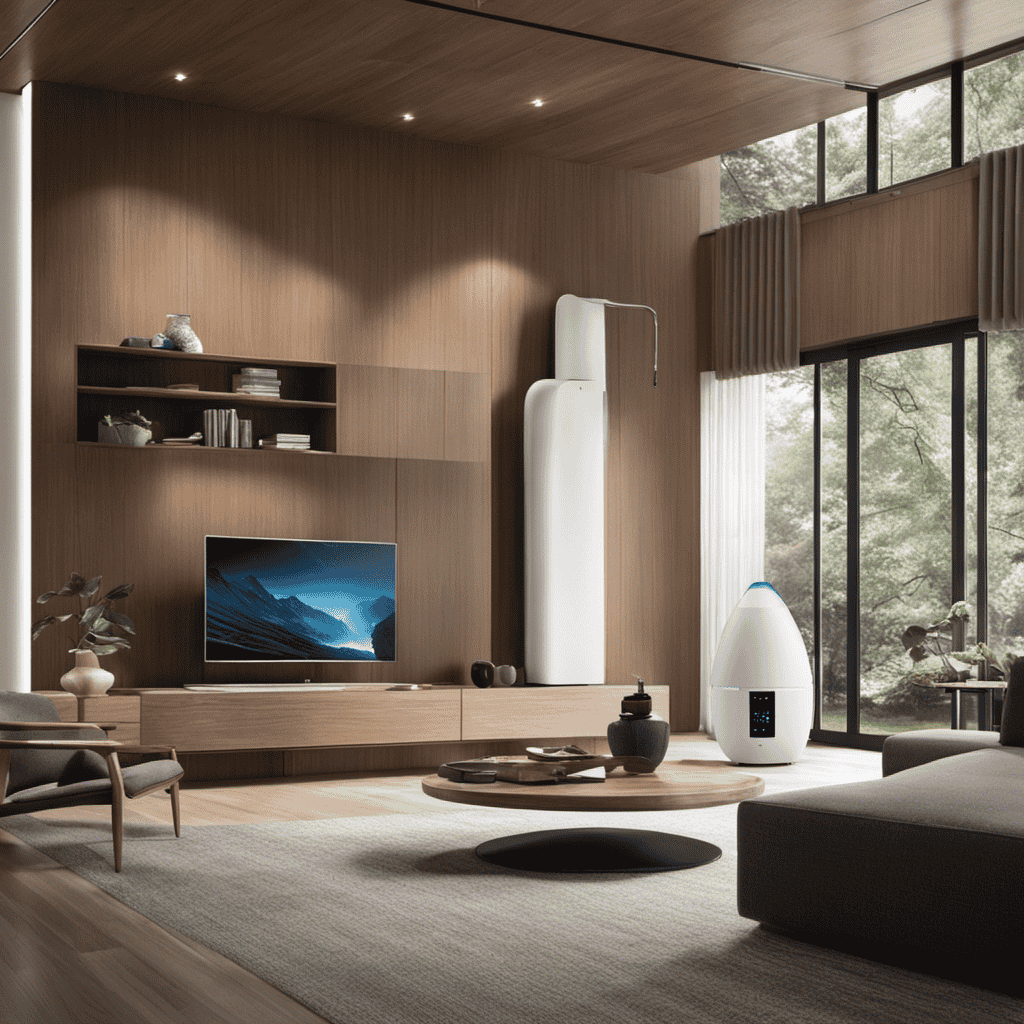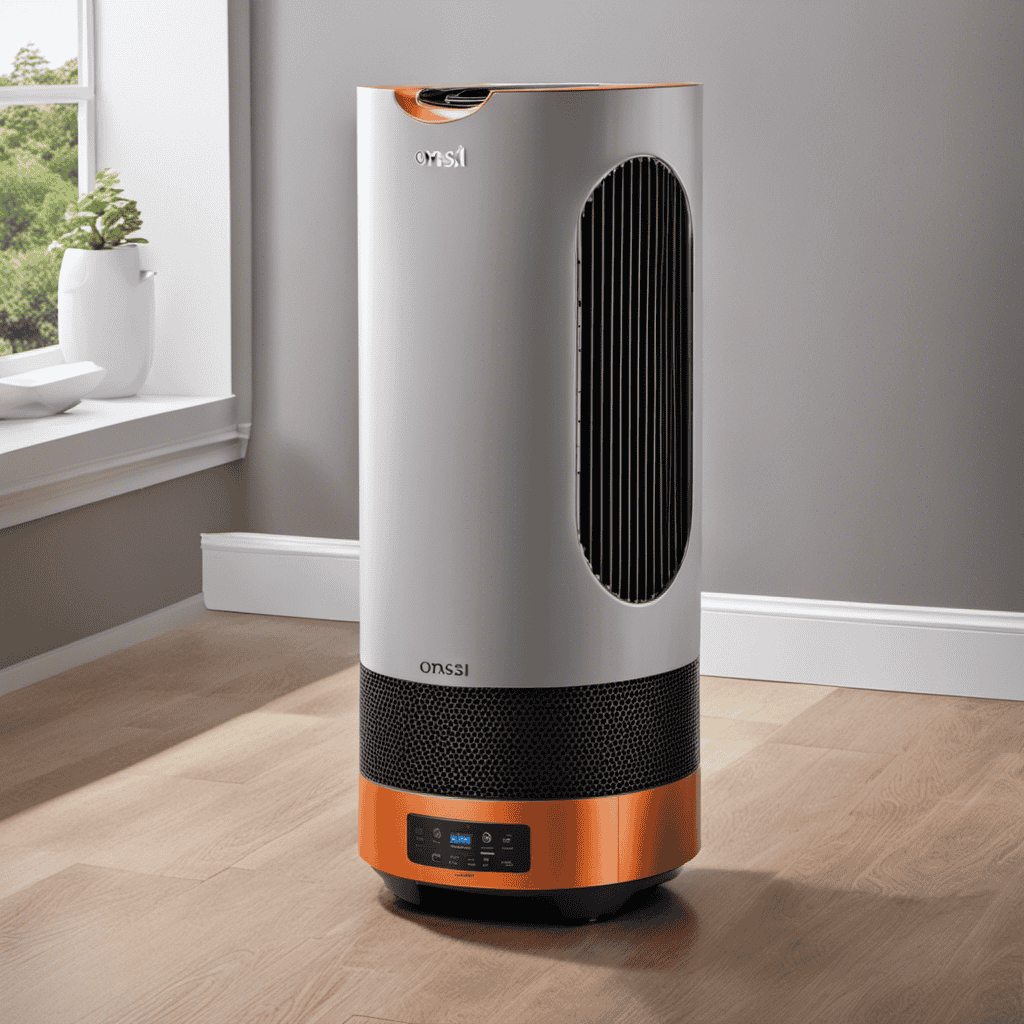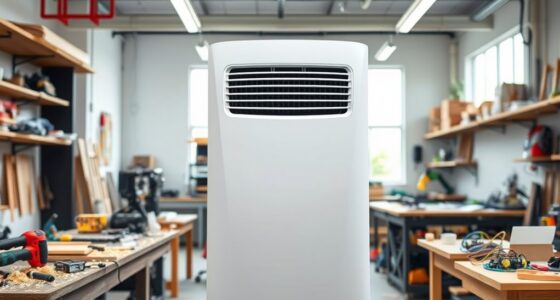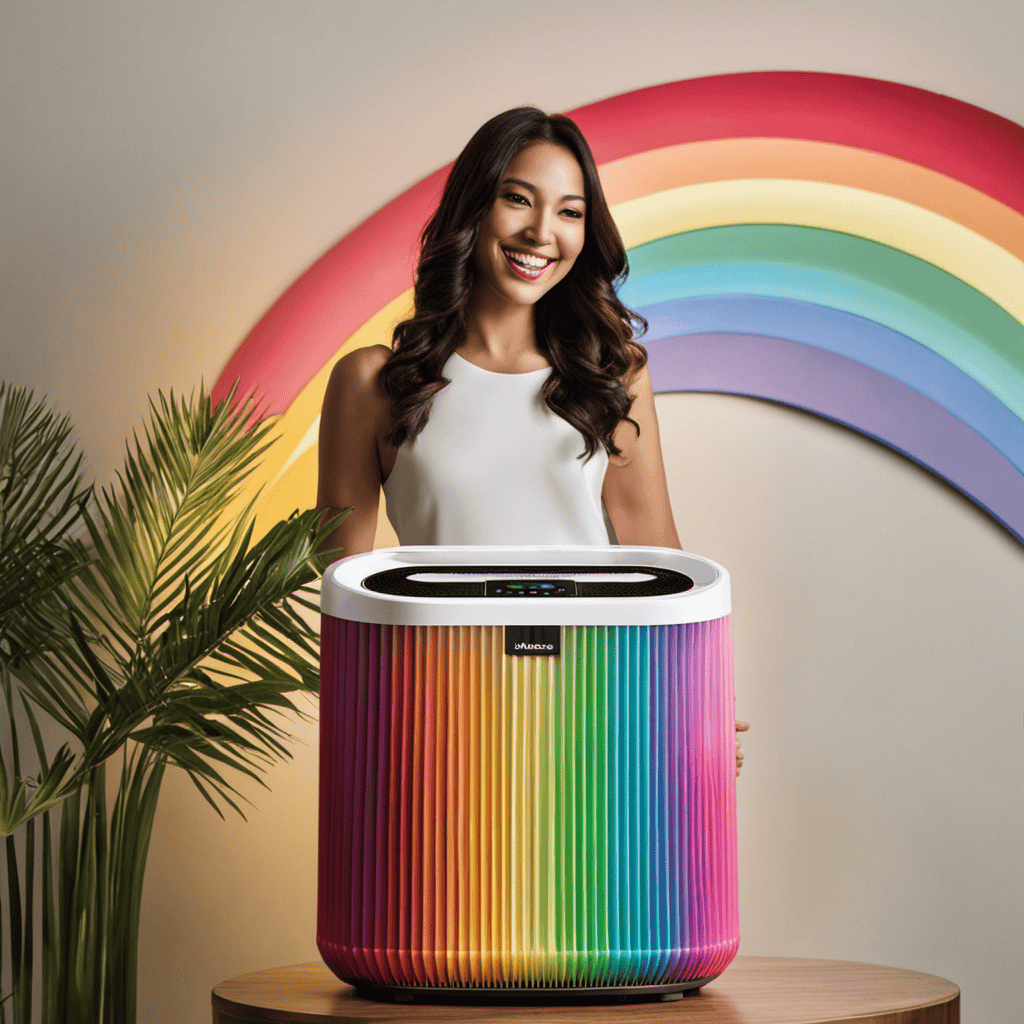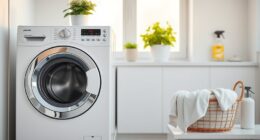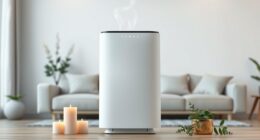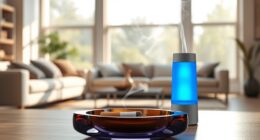I’ve consistently battled with allergies and subpar air quality inside my home. This led me to consider purchasing either an air purifier or a humidifier. Following thorough investigation and experimentation, I came to appreciate the advantages of each.
An air purifier removes harmful pollutants, while a humidifier maintains proper humidity levels for improved respiratory health. But which is better for my home?
In this article, I’ll delve into the differences and help you determine which option is right for you.
Key Takeaways
- Air purifiers remove allergens and harmful substances from the air, improving breathing and overall lung health.
- Humidifiers alleviate dryness and improve comfort by adding moisture to the air, relieving dry skin and respiratory symptoms.
- Maintaining optimal humidity levels is crucial for overall well-being, as low humidity can lead to dry skin and increased risk of infections, while high humidity can create a breeding ground for mold and allergens.
- When choosing between an air purifier and humidifier, consider factors such as indoor air quality concerns, humidity levels in your area, maintenance and cost considerations, specific respiratory or skin conditions, and overall air quality in your home.
The Benefits of an Air Purifier
An air purifier can help improve indoor air quality by removing allergens, such as dust and pollen, from the air. Using an air purifier in your home has numerous benefits, especially when it comes to your respiratory health. By eliminating these airborne particles, an air purifier can reduce the risk of allergies and asthma attacks. It can also alleviate symptoms such as coughing, sneezing, and congestion.
Additionally, an air purifier can remove harmful substances like pet dander, mold spores, and volatile organic compounds (VOCs) that can negatively impact your respiratory system. This can lead to improved breathing and overall lung health.
Investing in an air purifier is a proactive step towards creating a healthier indoor environment and taking care of your respiratory well-being.
How an Air Purifier Improves Indoor Air Quality
Using an air purifier can greatly improve the quality of indoor air. Air purifiers play a crucial role in removing various types of air pollutants, ensuring a healthier living environment.
Here are some key ways in which air purifiers enhance indoor air quality:
-
Filtering out particulate matter: Air filters in purifiers trap and remove dust, pollen, pet dander, and other airborne particles.
-
Eliminating harmful gases: Purifiers equipped with activated carbon filters can effectively capture volatile organic compounds (VOCs) and odors.
-
Combating allergens and pathogens: HEPA filters in air purifiers are designed to capture tiny particles like mold spores, bacteria, and viruses.
By understanding the role of air filters and the types of air pollutants they target, one can make a well-informed decision about using an air purifier.
However, it is also important to consider the role of a humidifier in maintaining optimal indoor air quality.
Understanding the Role of a Humidifier
By increasing moisture levels in the air, a humidifier can alleviate dryness and help to improve overall comfort. Humidifiers play a crucial role in maintaining a healthy indoor environment by adding moisture to the air, especially during dry winter months or in arid climates.
The benefits of using a humidifier are numerous. Not only does it help to relieve dry skin, nasal congestion, and irritated throat, but it also helps to reduce static electricity, which can be a nuisance during the winter. Additionally, a humidifier can prevent the cracking of wooden furniture and floors caused by low humidity levels. It can even help to prolong the life of houseplants by providing them with the moisture they need.
Transitioning into the next section about the importance of proper humidity levels in your home, it is essential to understand the impact that humidity has on our health and well-being.
The Importance of Proper Humidity Levels in Your Home
I’ve found that maintaining optimal humidity levels in your home is crucial for your health.
Low humidity can lead to dry skin, irritated respiratory passages, and increased risk of infections.
On the other hand, high humidity can create a breeding ground for mold, dust mites, and other allergens, which can trigger respiratory issues and worsen existing conditions.
Optimal Humidity for Health
To maintain optimal health, you should aim for a humidity level between 30% and 50% in your home. This range is crucial for both sleep quality and respiratory health.
Here’s why:
-
Optimal humidity for sleep: Adequate humidity levels can greatly improve your sleep. When the air is too dry, it can cause dry throat and nasal passages, leading to discomfort and difficulty breathing. On the other hand, excessive humidity can create a breeding ground for dust mites and mold, triggering allergies and respiratory issues. Maintaining the right humidity level ensures a comfortable sleep environment.
-
Optimal humidity for respiratory health: Dry air can irritate the respiratory system, causing symptoms like coughing, wheezing, and dry throat. On the other hand, high humidity can promote the growth of allergens and irritants, exacerbating respiratory conditions like asthma and allergies. Maintaining optimal humidity levels can help alleviate these symptoms and promote better respiratory health.
Effects of Low Humidity
Low humidity can lead to dry skin, irritated eyes, and increased susceptibility to respiratory infections. When the air lacks moisture, it can cause our skin to become dehydrated and lose its natural moisture barrier. This can result in dryness, itchiness, and even flaking.
Additionally, low humidity can cause our eyes to feel dry and irritated, leading to discomfort and potential vision problems. Moreover, low humidity can have a negative impact on our respiratory system. Dry air can dry out the mucous membranes in our nose and throat, reducing their ability to trap and filter out harmful particles, such as dust and bacteria. This increases our susceptibility to respiratory infections.
To combat these health effects of low humidity, it is important to consider increasing humidity levels in our indoor spaces, especially during dry seasons or in areas with naturally low humidity.
Risks of High Humidity
High humidity can lead to mold growth, which can trigger allergies and respiratory issues. Mold thrives in damp environments, and when humidity levels are high, it provides the perfect conditions for mold spores to multiply and spread.
This can pose serious health risks, especially for individuals with allergies or respiratory conditions. To mitigate the risks of mold growth and improve indoor air quality, using a dehumidifier is highly recommended. A dehumidifier helps to reduce excess moisture in the air, making it more difficult for mold to grow.
Comparing Air Purifiers and Humidifiers: Which Is Right for You
When it comes to improving indoor air quality and maintaining optimal humidity levels, two popular options are air purifiers and humidifiers. Both devices have their own unique functions and benefits, but choosing the right one for your home depends on several factors.
In this discussion, we will explore the key differences between air purifiers and humidifiers, and provide insights on how to select the device that best suits your needs.
Purifier Vs. Humidifier
Although both options have their benefits, it’s important to consider your specific needs when deciding between an air purifier or humidifier for your home.
A purifier offers several benefits, including:
- Removes airborne allergens and pollutants
- Helps to reduce asthma and allergy symptoms
- Improves overall air quality
On the other hand, a humidifier provides several advantages, such as:
- Adds moisture to the air, which can alleviate dry skin and respiratory issues
- Helps to reduce static electricity and dryness in the home
- Provides relief from cold and flu symptoms
When choosing the right device for your home, it’s crucial to evaluate your specific requirements. Consider factors such as the climate in your area, any respiratory or skin conditions you may have, and the overall air quality in your home. This will help you make an informed decision and select the device that best suits your needs.
Choosing the Right Device
Now that we have discussed the differences between air purifiers and humidifiers, let’s move on to choosing the right device for your home.
When considering which device to purchase, it is important to weigh the pros and cons of each option.
Air purifiers are excellent for removing pollutants, allergens, and odors from the air, providing cleaner and healthier indoor air quality. They can be especially beneficial for those with respiratory issues or allergies.
On the other hand, humidifiers add moisture to the air, alleviating dryness and improving respiratory symptoms. They are particularly helpful during the winter months when the air tends to be drier.
When it comes to the best brands, some top options for air purifiers include Honeywell, Blueair, and Coway. For humidifiers, popular brands include Dyson, Vicks, and Levoit. It is always recommended to research and read customer reviews to find the device that best suits your needs and preferences.
Factors to Consider When Choosing Between an Air Purifier and Humidifier
To make the best decision between an air purifier and humidifier for your home, consider various factors. Here are some key factors to consider:
-
Indoor air quality: If you have concerns about airborne pollutants such as dust, pollen, or pet dander, an air purifier may be the better choice. It can help remove these particles and improve the overall air quality in your home.
-
Humidity levels: If you live in a dry climate or have issues with dry skin, allergies, or respiratory problems, a humidifier can help add moisture to the air and alleviate these symptoms.
-
Maintenance and cost: Air purifiers typically require regular filter replacements, while humidifiers may require regular cleaning and maintenance. Consider the ongoing costs and time commitment associated with each device.
Both air purifiers and humidifiers have their pros and cons, so it’s important to evaluate your specific needs and priorities before making a decision.
Tips for Maintaining and Getting the Most Out of Your Air Purifier or Humidifier
Regular maintenance and cleaning are essential for maximizing the effectiveness and longevity of your air purifier or humidifier.
To maintain your air purifier, start by checking and replacing the filters regularly. Clean the exterior of the unit with a damp cloth to remove any dust or debris. It is also important to clean the air intake vents to prevent clogs.
For humidifier maintenance, clean the water tank and replace the water regularly to prevent the growth of bacteria or mold. Use distilled water to minimize mineral buildup. Additionally, clean the humidifier’s components, such as the misting nozzle or wick, according to the manufacturer’s instructions.
Which is more effective for alleviating allergy symptoms: an air purifier or a humidifier?
When it comes to alleviating allergy symptoms, the debate of air purifier vs humidifier for allergies is ongoing. While an air purifier can help remove airborne allergens like dust and pet dander, a humidifier can ease nasal passages. Both can be effective, but it ultimately depends on the specific allergy symptoms.
Frequently Asked Questions
Can I Use an Air Purifier and a Humidifier in the Same Room?
Yes, you can use an air purifier and a humidifier in the same room. Both have different purposes – an air purifier removes pollutants while a humidifier adds moisture. Using both together can improve indoor air quality and promote comfort.
How Often Should I Clean My Air Purifier or Humidifier?
Cleaning your air purifier or humidifier regularly is crucial for optimal performance. Neglecting maintenance can lead to decreased efficiency and potential health risks. To ensure a healthy and clean environment, it is recommended to clean them according to the manufacturer’s instructions.
Are There Any Potential Health Risks Associated With Using an Air Purifier or Humidifier?
There are potential health risks associated with using an air purifier or humidifier. However, the benefits of using these devices, such as improved air quality and moisture levels, can outweigh the risks if used properly.
Can an Air Purifier or Humidifier Help With Allergies or Asthma?
Using an air purifier or humidifier can greatly benefit your overall well-being. Different types of air purifiers and humidifiers offer varying levels of effectiveness. They can help with allergies and asthma by improving air quality in your home.
What Is the Average Lifespan of an Air Purifier or Humidifier?
The average lifespan of an air purifier or humidifier depends on the brand and model, but with proper average maintenance, they can last for several years. Both have their benefits and drawbacks, so it’s important to consider your specific needs.
Conclusion
After carefully considering the benefits and functions of both air purifiers and humidifiers, I have come to the conclusion that there is no definitive answer as to which is better for your home.
It ultimately depends on your specific needs and preferences.
Both devices play important roles in improving indoor air quality and maintaining proper humidity levels.
So, whether you choose an air purifier or a humidifier, rest assured that you are taking a crucial step towards creating a healthier and more comfortable living environment.
